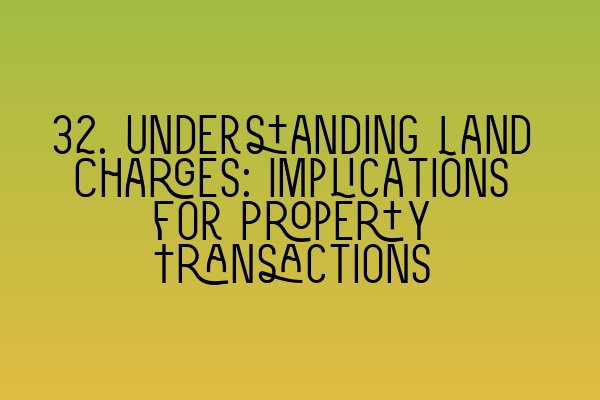Understanding Land Charges: Implications for Property Transactions
When it comes to property transactions, it is crucial to have a comprehensive understanding of land charges and their implications. Land charges are legal restrictions or interests that affect a property and need to be taken into account during the buying or selling process. As a solicitor practicing property law, it is essential to navigate these charges efficiently to protect your client’s interests and ensure a smooth transaction.
In this blog post, we will delve into the intricacies of land charges, explore their different types, and discuss their significance in property transactions. So, if you want to enhance your knowledge in this area and provide better services to your clients, keep reading!
What are Land Charges?
Simply put, land charges are registered interests or rights that are not automatically evident on a property’s title. They can be overreached by a conveyance of the land but will continue to affect the land until they are dealt with or discharged.
Land charges can be in the form of financial charges, restrictions, or other encumbrances, and they are registered against the property itself rather than the owner. This means that even if the property changes hands, the land charge remains.
The Different Types of Land Charges
There are various types of land charges, each with its own implications in property transactions. Let’s take a closer look at some of the most significant ones:
1. Local Land Charges
Local land charges are charges imposed by local authorities, such as County Councils or District Councils. These charges include planning permissions, listed buildings, conservation areas, and tree preservation orders.
When dealing with property transactions, it is crucial to conduct a local search to determine if any local land charges affect the property. This search will help you identify any planning restrictions or obligations that may impact the property’s use or development.
2. Class of Title Restrictions
Class of title restrictions are limitations imposed on properties within a specific area. These restrictions aim to maintain the character, appearance, or use of properties in that area. Examples include restrictions on alterations, extensions, or changes in use.
As a solicitor, it is essential to identify any class of title restrictions affecting a property and inform your client accordingly. It is also crucial to advise them on the restrictions’ implications and whether they align with their intended use for the property.
3. Restrictive Covenants
Restrictive covenants are private agreements or promises made between parties concerning the use or development of the land. These agreements are usually outlined in the property’s title deeds and bind subsequent owners.
When dealing with property transactions, it is crucial to review the title deeds and identify any restrictive covenants that may affect the property. This includes restrictions on alterations, building extensions, or changes in use. Failure to address these covenants can result in breaches and legal complications in the future.
4. Equitable Charges
Equitable charges are interests or rights that are not yet registered at the Land Registry but have the potential to be registered. These charges are usually created through a legally binding agreement or mortgage.
When engaging in property transactions, it is essential to investigate any equitable charges that may affect the property. Failure to do so can result in unforeseen legal complications or disputes in the future.
Implications for Property Transactions
Now that we have explored the different types of land charges, let’s discuss their implications for property transactions:
1. Disclosures: As a solicitor, it is your responsibility to disclose any known land charges to your client during the buying or selling process. Failure to do so can breach your duty of care and lead to potential legal liabilities.
2. Negotiations: Land charges can impact the value, use, or development potential of a property. Therefore, it is important to consider these charges during negotiations and advise your clients accordingly.
3. Due Diligence: Conducting thorough due diligence is essential when dealing with property transactions. This includes conducting local searches, reviewing title deeds, and investigating any potential land charges. By doing so, you can identify any issues or risks associated with the property and advise your clients accordingly.
4. Documentation: Land charges can require specific documentation, such as consent or notice requirements. It is your responsibility as a solicitor to ensure that the necessary documentation is prepared and executed correctly to avoid any future legal disputes.
Conclusion
Land charges are a crucial aspect of property transactions and require a comprehensive understanding to protect your clients’ interests. By familiarizing yourself with the different types of land charges and their implications, you can provide better advice and navigate the buying or selling process with confidence.
At SQE Property Law & Land Law, we specialize in property law and offer SQE preparation courses to help aspiring solicitors excel in their careers. Check out our related articles for additional resources:
- SQE 1 Practice Exam Questions
- SQE 1 Practice Mocks FLK1 FLK2
- SQE 2 Preparation Courses
- SQE 1 Preparation Courses
- SRA SQE Exam Dates
Feel free to reach out to us for any inquiries or to enroll in our courses. Enhance your knowledge and excel in the field of property law with SQE Property Law & Land Law!
